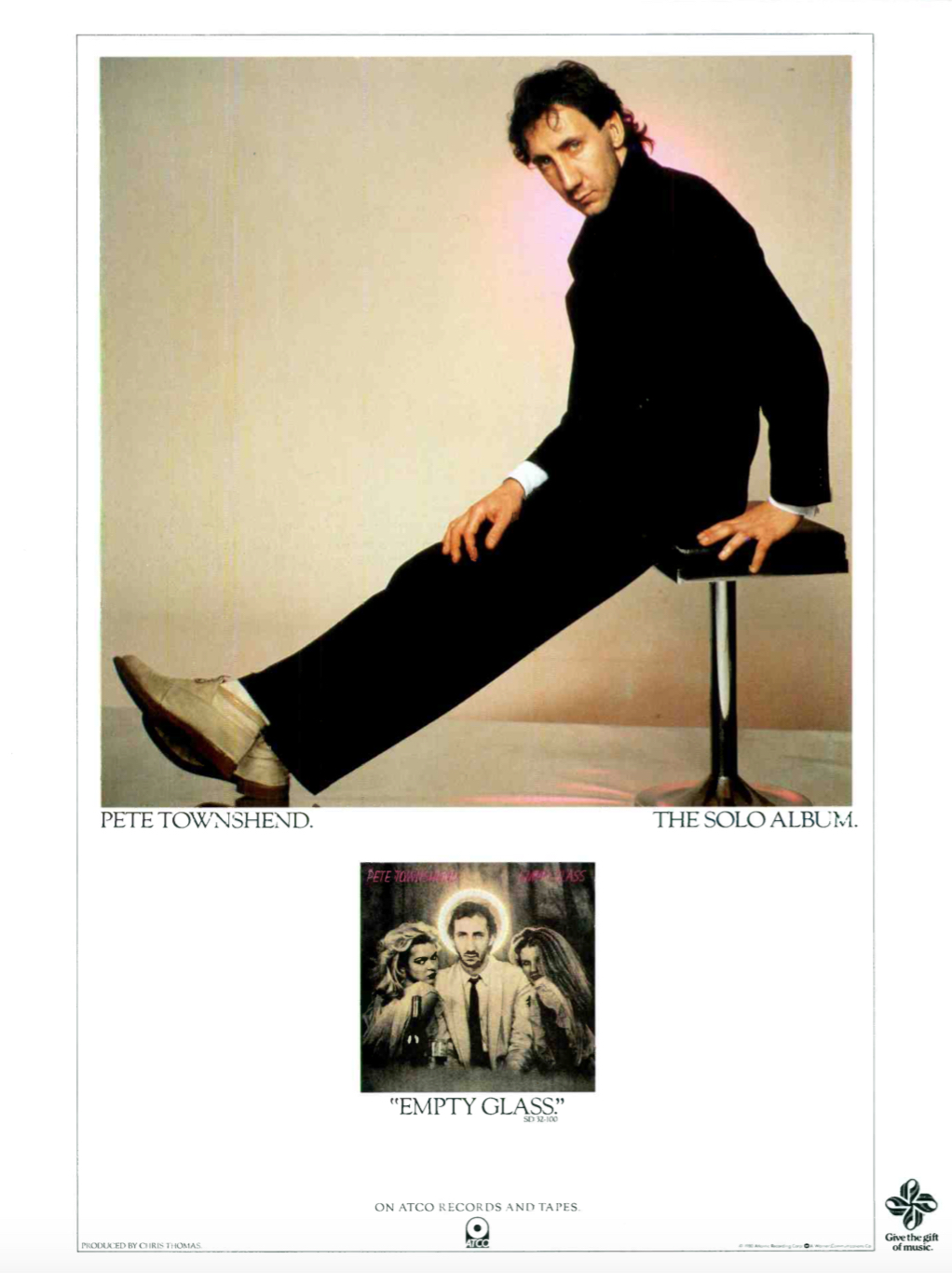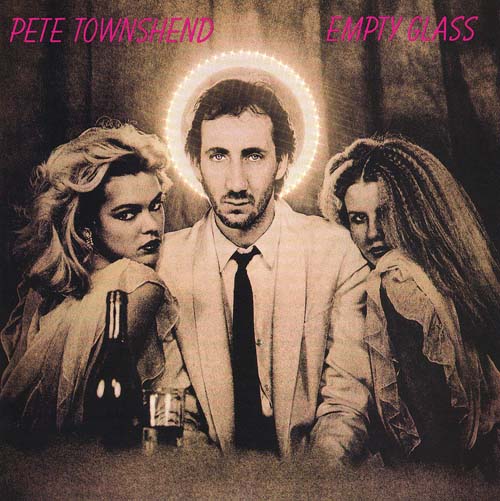
In the wake of drummer Keith Moon’s death from an accidental overdose three weeks after the August 1978 release of Who Are You, The Who was quick to affirm their determination to continue as a going concern. In the short term that meant bringing on Kenney Jones as Moon’s replacement by November, and adding John “Rabbit” Bundrick on keyboards in live settings.
In May of the following year the refitted band made its live debut, and the new lineup’s initial recordings soon followed with fresh tracks on the Quadrophenia soundtrack. The group seemed to have weathered that tragedy (and others, including the December 1979 death of 11 fans at its concert in Cincinnati) with remarkable resiliency, but the journey to Face Dances in 1981 would include several detours. One of them, Pete Townshend’s May 1980 solo project Empty Glass, has been cited as a Who record that never was, but its final form benefits from development as the guitarist’s personal project, and would have been diminished as a band enterprise.
Listen to the title track from Empty Glass
The strongest case in point is the album’s first track, “Rough Boys.” Meshing punk motifs with a heap of melodic charm, it is a remarkably open homoerotic contemplation from someone who would deny, then seemingly affirm, then deny again before finally basically shrugging his shoulders in recent years regarding his own bisexuality. Matched to propulsive rock long on bravura barking and punk underpinnings, it’s a balancing act akin to landing a flipped coin on its edge, yet it coalesces thanks to the conviction and vocal snap with which Townsend yelps the likes of, “We can’t be seen together.” It is unimaginable that Daltrey would have delivered the same lyric, let alone with such brio, and a watered-down version wouldn’t be nearly the same song. Featuring Jones on drums alongside Townshend’s ringing electric guitar, the tune reached #89 on the Billboard Hot 100 as the album’s second single.
Watch the music video of “Rough Boys”
Townshend’s third solo record was his first built of true originals, and the first real harbinger of what would become a healthy solo piece of his career. It wasn’t all new to the project, as a couple of Empty Glass tracks, including its title track, were leftovers from the Who Are You sessions. Built from driving rock with discernible traces of doo-wop and other flavors before it shifts gears to float along with cool spirituality and meditative grace, “Empty Glass” was altered from the original (which appears on Who Are You’s 1996 remaster) to remove a lyrical allusion to suicide, one of many things on Empty Glass that feels the influence of Moon’s passing.
The Who Are You sessions also passed along “Keep on Working,” an oddly mechanical piece in which a refined vocal bridges a lockstep refrain and an oddball croaked spoken-word undercarriage. Right down to its choral dressing, it’s a curio that is typical Townshend in its attempt to balance ideas and disciplines, combining the reflexive with the fluid in robotic set pieces draped with Bundrick’s piano. The whole amounts to an insistent, not-quite-grabby patchwork, which was offered as a single in the U.K. and failed to chart.
Townshend’s versatility as the Who’s lead songwriter is undiluted in his solo work, in which twists and turns come with every song. “Jools and Jim” is a garage-style thrash on its face, but along with the low-sheen guitar and lively Townshend bark comes a cool falsetto gear shift.
Listen to “Jools and Jim”
Townshend’s equilibrium of refinement and raw energy pays frequent dividends. Even the straight-bore rock ramble “Cat’s in the Cupboard” keeps its shape as it escalates, with punchy Simon Phillips drums (recorded a decade before he would serve as drummer on the Who’s 1989 reunion tour) and Peter Hope-Evans’ blistering harmonica fueling a focused blowout finish.
Empty Glass is rich with ideas, featuring contemplations of fidelity, sexuality, substance abuse and mortality. The supple throb of “I Am an Animal” is cool, slender and colored by Townshend’s easy reach into falsetto, put to work in an appropriately portentous lyrical reading in a thoughtful traverse from mellow wail to near-whisper. His meditative tendencies are in full flower for “And I Moved,” his echo-trimmed vocal floating alongside an ethereal pulse driven by Bundrick’s springy piano backbone. Townshend wrote the song for Bette Midler, but it was rejected; it seems an odd fit for her conceptually, but it’s similarly uncharacteristic for Townshend, and yet its dreamy reflection works.
In “A Little is Enough,” a pulsating synthesizer spine behind its burbling, steady throb feels cribbed from the prog handbook, while Townshend’s bark offers an anchoring urgency. Its chipper pulsation is held down by Mark Brzezicki on drums and Tony Butler on bass, the “Rhythm for Hire” duo who would soon become the Big Country rhythm section; the album’s second single release, it reached as high as #72.
It is inevitably peculiar when artists are dismissive of their popular work, and Townshend’s “Let My Love Open the Door” is no exception. Hugely successful as the album’s first single, it launched the record effectively, but Townshend would later brush it off as not among his favorites because it’s “just a ditty.” Notwithstanding the potency of uncomplicated appeals, that sentiment also sells short a song that delivers considerable flavor in its synthesizer-prodded spring, right down to the deeper chorus response vocals that give it buoyancy. Phillips’ drums deliver a lively punch to a deliriously catchy, highly memorable single that is well off the average love song’s beaten path: “You’re so lucky I’m around” is a hilariously self-assured way to punctuate an offering of devotion. Reaching as high as #9 on the Billboard singles chart, it would prove to be the biggest hit of Townshend’s solo career.
The album-closing “Gonna Get Ya” is a remarkable six-and-a-half minutes of simmering workout as Townshend reaches into throwback and contemporary sensibilities in equal measure, and embraces both abandon and precision. Textured by Bundrick’s swirls of piano and a hearty vocal bed, it’s a cerebral brew that drags listeners along for the ride.
Related: Townshend’s 10 best guitar moments with the Who
Townshend wasn’t the only Who member working on a side project at that point. Singer Roger Daltrey was starring in the film McVicar and would release a soundtrack for the film two months after Empty Glass. Daltrey would nonetheless later lament that Empty Glass was a missed opportunity for the Who, using material that would have served the group well. Townshend’s position as the Who’s primary songwriter means that could be said about any of his solo projects, and given Daltrey’s own outside interests, indicated something of a double standard.
Ultimately, Empty Glass is a fully satisfying in its own form. Propelled by the chart fireworks of “Let My Love Open the Door,” it climbed as high as #5 on the Billboard albums chart, just one position short of the peak the Who would achieve a year later, when Face Dances came to market.
[Many of Townshend’s solo albums are available in the U.S. here and in the U.K. here.]


2 Comments
“Empty Glass” has long been my favorite Pete Townshend solo album — and I think it bests The Who’s post-Moon releases of the day. A classic album.
Pete’s solo work in the 80s was of extremely high quality, with his writing as excellent as ever. Too bad he didn’t tour the US on his own at that time, but he certainly was busy.